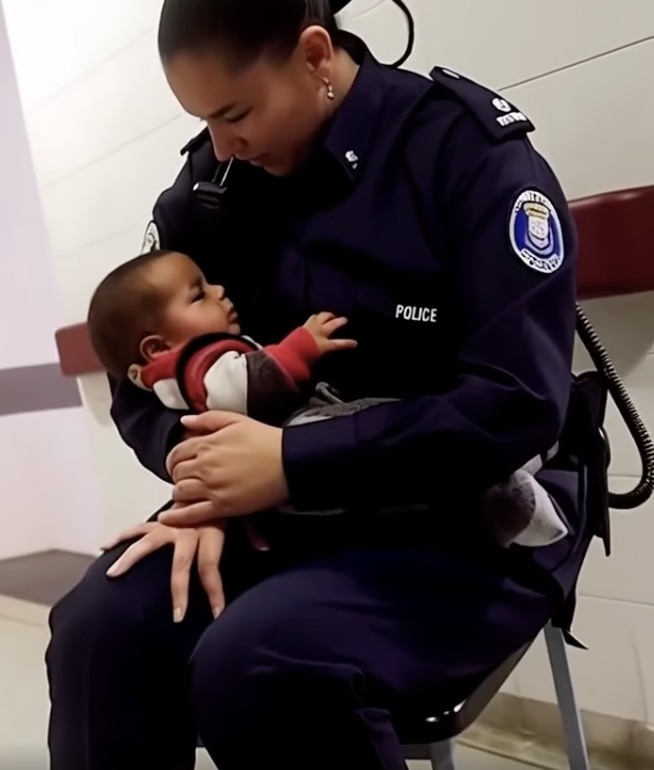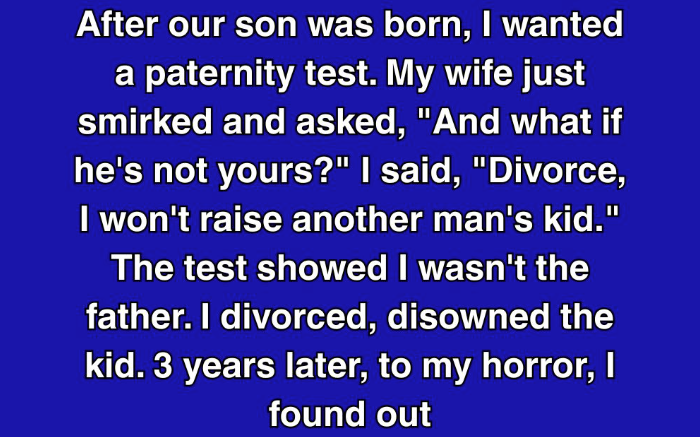It began like any other shift—routine patrols, dispatch calls, and the quiet rhythm of city life under the watch of those who serve and protect. I had no idea that by the end of the day, I would be cradling a tiny life in my arms, making decisions that would haunt, humble, and ultimately heal me.
That afternoon, we received a report about a distressed woman wandering near the hospital. By the time we arrived, she had vanished. But what she left behind would change the course of many lives—a baby, alone and crying.
He was so small, barely a few weeks old, wrapped in thin, oversized clothing that offered little warmth. A nurse later told us he had been crying for hours, left without food, comfort, or any sign of his mother. His cries were soft but urgent, echoing down the sterile hospital hallway like a plea. Something within me stirred—perhaps a deep parental instinct, perhaps just human empathy. I found a chair, removed my vest, and scooped the baby into my arms.
He immediately clung to me, his tiny fingers gripping my uniform, searching for solace. Around us, people paused to witness the moment—a uniformed officer, gently cradling an abandoned infant. But in that instant, it wasn’t about uniforms or badges. It was about love, human connection, and the powerful, silent bond between a protector and a vulnerable soul.
That baby needed more than protocol. He needed warmth, affection, and nourishment—and in that moment, I was all he had.
A Baby Named Oliver, A Name That Carried Hope
Over the following days, no one came to claim the child. Social services stepped in and gave him a name—Oliver. A simple name, but somehow perfect for a boy whose wide eyes absorbed everything with silent curiosity.
Initially, my visits to the hospital were part of the investigation. But over time, they became something else entirely. He wasn’t just a case anymore—he became someone I looked forward to seeing. While other infants often cried or fussed, Oliver was calm, as though grateful for every moment of care. He recognized kindness.
Back at home, my wife Lila began to notice the shift. “You’ve been working late,” she said one evening while we folded laundry. Our daughter Mia was nearby, stacking her colorful blocks.
“Just a case I can’t stop thinking about,” I admitted, half-truthful.
Lila didn’t press me. Her knowing glance told me she understood more than I could say out loud. She always did.
An Unexpected Visit That Changed Everything
One night, long after my shift had ended, I returned to the hospital again. Something kept pulling me back to Oliver, to make sure he was safe and comforted. In the nursery, lit only by a crescent-shaped nightlight, I found him awake. When he saw me, he kicked with joy and reached out.
“You’re stronger every day,” I whispered, lifting him into my arms.
Then, from the doorway, a quiet voice broke the moment. A young woman stood there—pale, exhausted, her clothes worn and her eyes filled with uncertainty.
“Is… is that my son?” she asked.
Her name was Elena. And her story was heartbreaking. She had been living out of her car after losing her job. Oliver, born prematurely, needed care she couldn’t afford. Overwhelmed by despair and fearing she couldn’t provide for him, she made the impossible choice to leave him at the hospital, praying someone would help him.
We spoke for hours in the cafeteria over stale coffee. She wept, admitting her guilt and fear. “I thought he’d die because of me,” she whispered.
I told her the truth: “If you want him back, there is a path. It’s not easy, but with help, you can prove that you’re ready to care for him.”
With renewed determination, she nodded. “I’ll do whatever it takes.”
The Power of a Second Chance
Over the following months, Elena followed through on her promise. Social services, charities, and local support networks worked together to provide housing, counseling, and job placement. Slowly but surely, she rebuilt her life.
During that time, Oliver remained in foster care. But I still visited when I could—bringing him toys, reading stories, and singing lullabies. He would laugh and squeal, his joy infectious. Each visit reminded me of why we serve—not just to uphold the law, but to uplift lives.
Finally, the day came for Elena and Oliver’s reunion. I was honored to be there at the courthouse, watching as she embraced her son, tears streaming down her face.
“You saved us,” she told me later.
But I shook my head gently. “No, Elena—you saved yourself. I was just there to help you find the way.”
A Full Circle Moment
Months passed. Life returned to its steady rhythm. Then, one sunny Saturday, I heard a knock on the door.
There stood Elena—with little Oliver in tow, now a chubby-cheeked toddler with a radiant smile. He ran into my arms, laughing. Elena handed me a soft canvas bag. Inside was a handmade quilt, stitched with stars, moons, and footprints. On the back, in delicate cursive, were the words: Thank you for being our guiding light.
My heart swelled. “This is beautiful,” I said, choking back tears.
That quilt now lives on our couch. My daughter Mia often curls up under it, calling it her “magic blanket.” My wife teases me sometimes—“Looks like you’ve got another admirer.”
But deep down, we both know what that quilt truly represents—a journey of healing, grace, and the life-changing power of compassion.
The Lesson That Stayed With Me
Being a police officer isn’t just about enforcing laws. It’s about showing up when people are at their most vulnerable. Sometimes, the smallest acts—a warm embrace, a listening ear, a second chance—can change someone’s entire world.
If this story moved you, I invite you to share it. Not for me—but for the Olivers and Elenas out there who need to be reminded that help, hope, and humanity still exist.
Because kindness isn’t weakness. It’s courage in its most powerful form.




